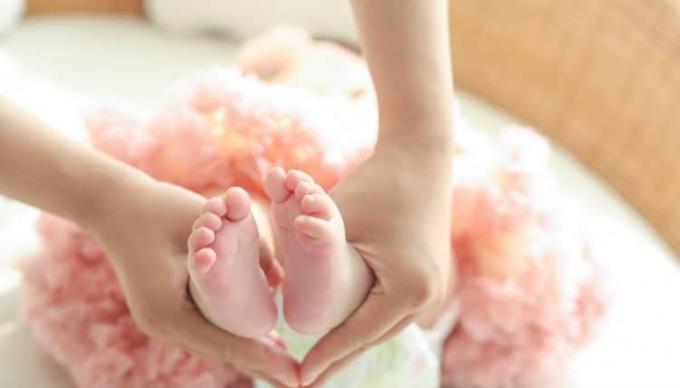Today, there are a lot of famous mothers over the age of 45. No one says that women in their late 40s and 50s cannot conceive, but getting pregnant at this age is potentially risky. Science is advancing, which has enabled women aged 55–65 to do the things they could not have done before, namely, pregnancy and childbirth. How to do this? Please join aFamilyToday Health to follow the sharing below.
A woman's fertility begins to decline as she gets older and ends with perimenopause (12 consecutive months without menstruation). The average age for women to start menopause is about 51 years, after which a woman will no longer be able to give birth. At this stage, the menstrual cycle will change and the amount of menstruation will be less.
Usually, a woman's egg quality decreases with age. Therefore, the children of pregnant mothers as they age are at risk of chromosomal abnormalities, causing birth defects. Meanwhile, men remain fertile throughout life. However, the older the baby is, the more susceptible the baby is born to genetic defects.
So how to get pregnant after 50 years old? A healthy pregnancy is almost impossible. Only 0.01% of pregnant women after 47 years give birth normally. Therefore, the only way to get pregnant is in vitro fertilization and using donor eggs.
The ability to conceive
Getting pregnant after 45 is not the same as being pregnant at 20 . A 30-year-old woman is 20% more likely to conceive in any given month, while a woman in her 40s is 15%. At 45, the chance of getting pregnant drops to just 1%. Through the use of donor eggs and artificial insemination, this chance increases by 70–75%.
How to get pregnant after 50 years old

To have a normal pregnancy and a healthy baby, before conception, you need to do some preparatory steps:
• See an obstetrician if you have not conceived even though you have had a lot of sex times in 6 months. Or if you have problems such as ovulation, irregular periods, or fertility problems for you or your husband.
• Your doctor will give you some tests to check if there are problems with your ovaries and fallopian tubes. In addition, the doctor will also order the husband to do tests to check for sperm problems.
• If nothing is out of the way it is likely because your egg quality is not good or you have some problems with infertility. At this point, depending on your health, your doctor will recommend in vitro fertilization or using donated eggs.
• With the method of using donor eggs and in vitro fertilization , you will first need to have an ultrasound of your uterus to make sure you can become pregnant and have a blood test done. After that, you'll have to do some psychological tests to make sure you're prepared for this method of pregnancy.
• In addition, you must also have medical examinations to control problems such as anemia, diabetes, heart, lungs and some other bad complications that can be encountered during pregnancy.
• After completing the above steps, you will be given an injection of the hormones estrogen and progesterone for 4 and a half weeks to prepare for fertilization. After an egg is implanted in the uterus, the woman will continue to take estrogen for another eight weeks. In addition, progesterone is also required until 10 weeks of pregnancy.
Advantages of pregnancy after 50 years
1. The mother lives longer
Women who have children after the age of 50 often live longer, whether they conceive naturally or conceive through assisted reproductive methods.
2. Finance

This is the period when the couple's finances are stable. One study even found that a woman's income typically increases by 9-10% per year if they delay having a baby. Being a parent will more or less affect the job, especially single parents. Therefore, at this stage you will feel more comfortable with financial problems.
3. Have more experience
One of the advantages of having a late pregnancy is that you have learned a lot of the experiences of those who went before. Besides, your mentality has become much more stable, so you will easily fulfill your parent's roles and responsibilities.
Limitations of pregnancy after 50 years of age
Besides the benefits, getting pregnant after 50 also has many disadvantages:
1. Health risks

One study shows that women who become pregnant after 50 years of age by in vitro fertilization can have a healthy pregnancy, as long as you are well cared for during pregnancy. However, some risks still exist. Late pregnancy makes you more susceptible to diseases such as diabetes , high blood pressure , pre-eclampsia ... In addition, you are also prone to premature birth, developmental delay and many other potential complications.
2. Physical problems
Pregnancy can be difficult for older women. In addition, the rapid increase in body weight during pregnancy also makes you feel tired easily.
3. For the fetus
Not only does the mother face health problems, but the fetus also carries certain risks, such as Down syndrome or genetic abnormalities. To reduce this risk, you can use eggs donated from young women.
4. Finance
If you are financially stable after 50 years old, you will have to face another problem. You will have to continue working even though you are old while other friends have begun to retire. Can you be healthy enough to earn money and take care of your kids? The old age diseases even add to your burden.
5. Age affects the birth process
In addition to increasing the risk of cesarean section and preeclampsia, age also affects labor and delivery. Women over the age of 35 face an increased risk of miscarriage and preterm delivery. However, saying that does not mean you will inevitably encounter these complications. Sometimes these complications never happen, but you should still find out.
6. Severe bleeding
Older mothers often experience excessive bleeding. Usually, pregnant older mothers stay in the hospital for longer and their babies often stay in intensive care. Babies may experience metabolic problems such as low blood sugar.
7. Problems using donated eggs
Women who use assisted reproductive techniques can also be at risk. Because donors are usually young women, while the users are older women, it is susceptible to genetic diseases.
Through the above sharing, hopefully you have found useful information for yourself. The decision is up to you, please consider it carefully.














